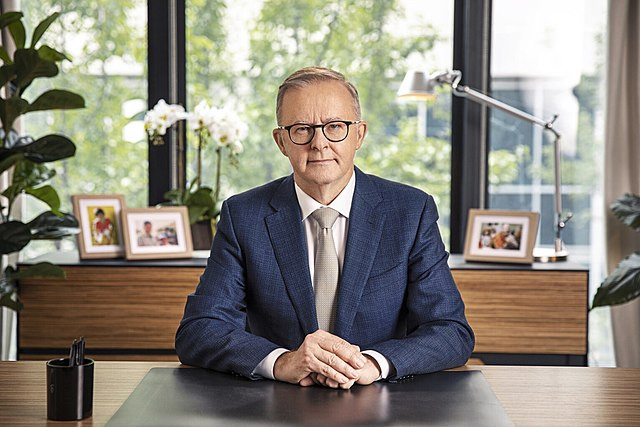Prime Minister Anthony Albanese's center-left Labor Party has won re-election, securing a parliamentary majority as early results showed a sharp swing away from Australia's conservative opposition. The Australian Broadcasting Corporation and Sky News projected the Labor victory Saturday night, marking the first time in 21 years that an incumbent prime minister has secured a second consecutive three-year term.
Opposition leader Peter Dutton lost his seat of Dickson in Brisbane, ending a 24-year tenure in Parliament. He addressed supporters Saturday night, saying, "We didn't do well enough during this campaign." He added, "I accept full responsibility."
The defeat marked a dramatic end for the Liberal Party's campaign, which had focused heavily on cutting government spending and expanding nuclear energy infrastructure. Dutton had pledged to eliminate more than one in five federal public service jobs to reduce expenditures, while proposing the construction of seven nuclear power plants. The Labor Party, by contrast, emphasized its record on renewable energy and cost-of-living relief.
Albanese addressed supporters in Sydney following the projections, stating, Serving as Prime Minister is the "greatest honour of my life." He added, "It is with a deep sense of humility and a profound sense of responsibility that the first thing that I do tonight is to say thank you to the people of Australia."
The campaign unfolded against the backdrop of rising consumer prices and heightened anxiety over global affairs, including tensions with the United States under President Donald Trump. Labor leaders frequently drew parallels between Dutton and Trump, referring to the opposition leader as "Doge-y Dutton" and warning that his policies would mimic the austerity model of Trump's Department of Government Efficiency, known as DOGE.
"We've seen the attempt to run American-style politics here of division and pitting Australians against each other and I think that's not the Australian way," Albanese said.
Labor's positioning was bolstered by Albanese's sharp response to Trump's April 2 tariff announcement targeting Australian exports. Speaking alongside his foreign and trade ministers, Albanese said, "This is not the act of a friend."
Dutton's campaign faced additional scrutiny after Jacinta Nampijinpa Price, tapped as his shadow minister for government efficiency, said she wanted to "make Australia great again." She later told reporters she hadn't realized she used the Trump-associated phrase.
On foreign policy, Albanese pointed to his government's success in restoring relations with China, which led to the lifting of trade sanctions imposed during his predecessor's term. His administration also deepened engagement with Pacific Island nations to counter growing Chinese influence in the region.
Andrea Carson, professor of political communication at La Trobe University, said the election took place during a challenging governing environment. "A high-inflation environment, which other developed economies have also experienced, provides limitations on the capacity for a government to act on those big structural reforms," she said.
Albanese campaigned on policies to address rising living costs, including a plan to build 1.2 million new homes, offer energy bill relief, and deliver tax cuts. His government says it has approved enough renewable energy projects to power 10 million homes and aims to cut emissions by 43% by 2030.






